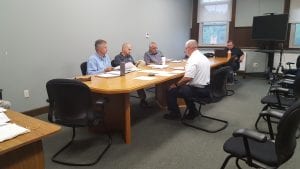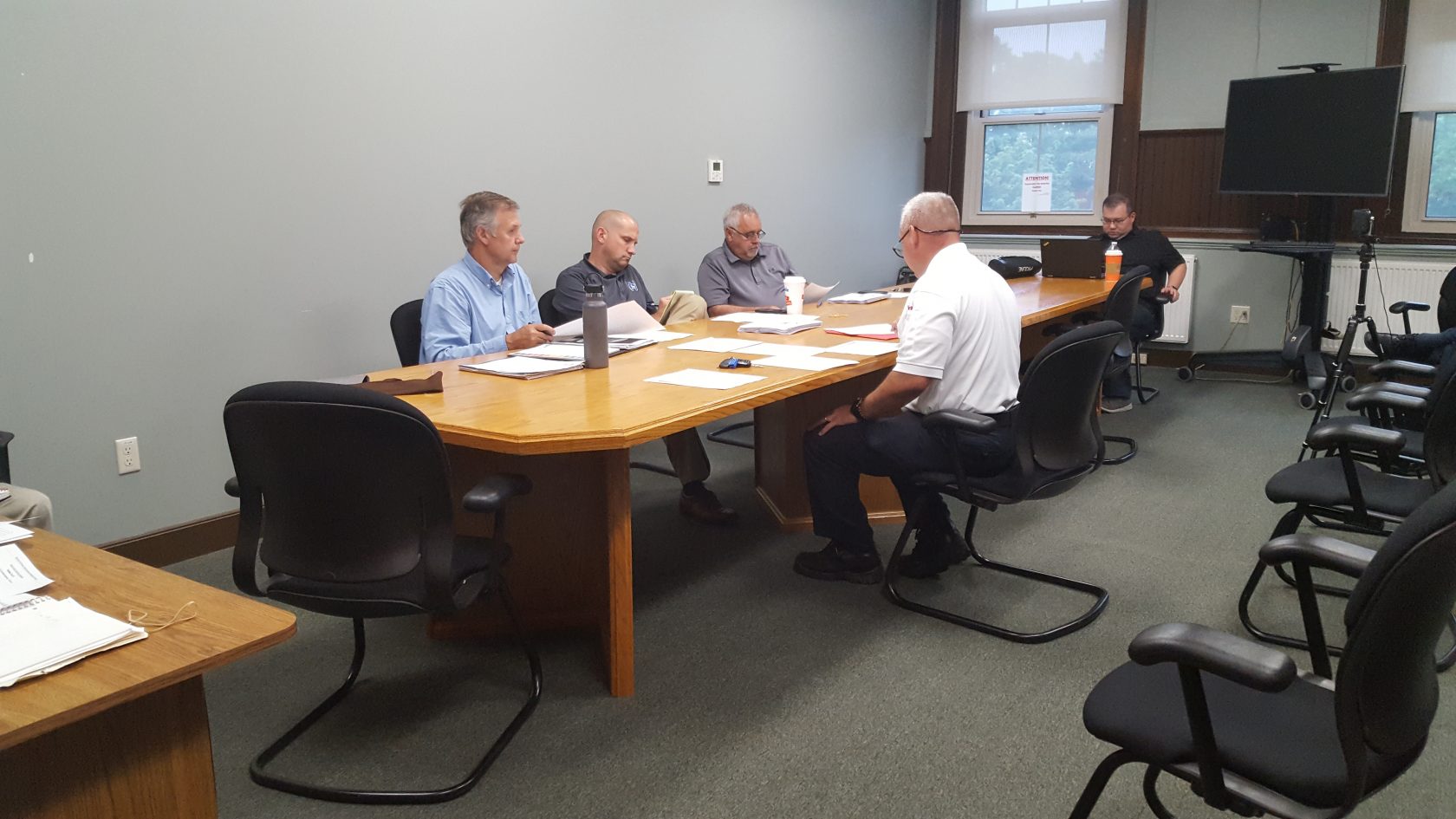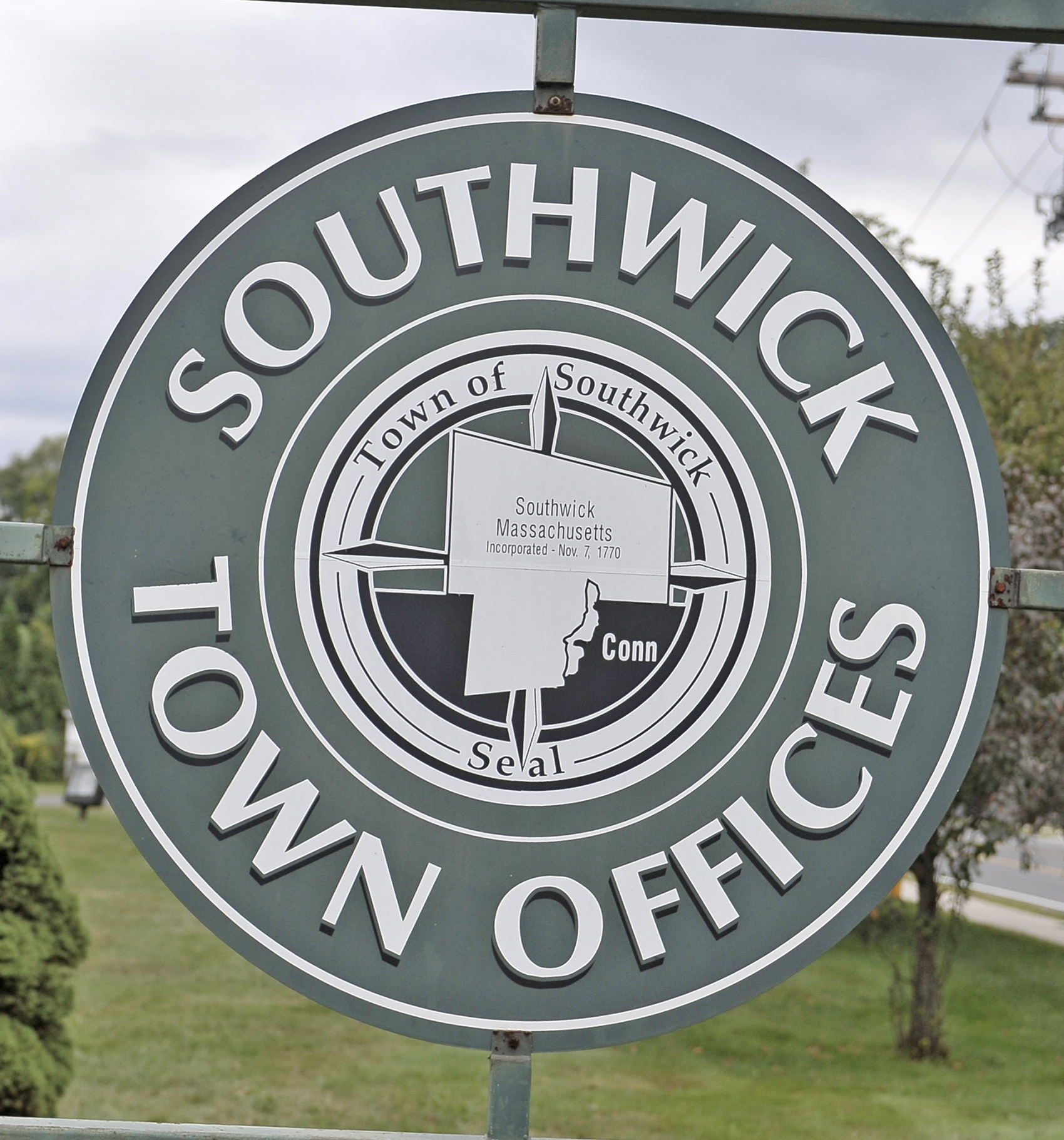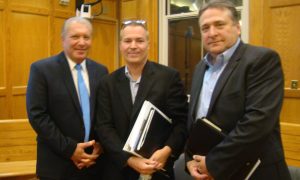
City Councilors Daniel Allie, Brent B. Bean II, and John J. Beltrandi III listen on as Fire Chief Patrick Egloff lays out the fire department’s budget. (Photo by Peter Currier)
WESTFIELD- The City Council Finance Committee met Tuesday evening at City Hall for the first set of hearings for city department’s FY20 budget requests. The first departments to come before the committee were health, treasurer, auditors, purchasing, and fire.
There were more than eight city councilors in attendance at the hearings, meaning that they could not engage in discussion or debate about any of the requested budgets because it created a full quorum. They could, however, ask questions for clarification.
The first hearing was for the Health Department. Westfield’s Director of Public Health Joseph Rouse first spoke about the city sanitary landfill, for which he said there would be little in the way of capital expenditures. His only request was to set aside money in the event of an equipment or vehicle failure.
Rouse said that there would be some Department of Environmental Protection (DEP) mandated engineering work on the landfill this year to curb erosion and make some repairs. He said he anticipated having to dip into their purchase of service fund to do so, which he estimates will cost $40,000-$50,000. Rouse added that he expects a three percent increase in the cost of trash service recycling costs.
When asked about possible personnel additions by Councilor Brent B. Bean II, Rouse said that he is expecting the retirement of one working foreman. He added that they are in need of two heavy equipment operators in the near future. There was also an $8,000 item in the purchase of services account for an emergency expenditure for when someone is moved from a condemned house or if there is an emergency cleanup.
The next hearing was for the Treasury Department, headed by City Treasurer Matthew Barnes. One anticipated expenditure for the year is for the installation of a credit card terminal in the treasury office for residents to pay bills in person without needing cash or a check. Barnes noted that, with the possible construction of a new school in the near future, the city should be funding a debt decline stabilization account, otherwise the city could be looking for an expensive bond payment for the school in just a few years.
Bean asked Barnes about the overall financial health of the treasury department and the city. Barnes said that the city is financially healthy with a stable outlook.
City Auditor Christopher Caputo said that 80 percent of his FY20 budget is employee salaries and the outside audit. The other 20 percent, Caputo said, is for travel and continuing education.
Caputo noted that the city should keep the levy ceiling ‘in the backs of their minds.’ The levy ceiling limits the amount of money a city can raise through real estate and property taxes, and is equal to 2.5 percent of the current fiscal year’s full and fair cash value of the city. He noted that Westfield is in good shape for the levy ceiling for a community its size, with the city currently being at 80 percent of the ceiling.
Director of Purchasing Tammy Tefft was then brought forward to present the Purchasing Department’s requested budget. The department’s function is to secure the goods and services that are needed for the city to operate the municipal government. Tefft described several projects that her office is overseeing over the next fiscal year. These projects include the water meter project, the new school, and a project to receive grant money for “green communities.” to make buildings and equipment more energy efficient.
Tefft noted that some departments in the city could be in need of good personnel. She said that it is extremely important that there be well-qualified project managers on all city projects, as it will save money over paying a less qualified project manager less money.
City Councilor Matt Emmershy asked Tefft if just one person could act as the project manager for several city projects at once. Tefft said that the school project and the project surrounding wells seven and eight are required by state law to have a project manager on site at all times during working hours. She noted that some smaller public works projects could have a single person overseeing multiple projects at once, but that one manager per project would almost always be better.
“I’m a big fan of oversight. You’re spending the money upfront, but you’re saving it ten-fold on the backhand side,” said Tefft.
The longest hearing of the evening was that of the Fire Department. Fire Chief Patrick Egloff spoke to the committee about what his department needs for the fire and ambulance budgets. For the ambulance budget, Egloff said that two new ambulances would be purchased in the fall of 2020. The first payments, however, are being made in FY20. He noted that two new ambulances are purchased every three years. The older existing ambulances being replaced will be re-serviced for another task.
He also announced a project to build a full-building generator at the fire department headquarters in the event of an emergency.
There was also an item in the fire budget for an emergency plan to occupy Fire Station One in the event of the closure of Cowles Bridge, which would prevent emergency vehicles from getting to some parts of the city. Egloff noted that the ambulance fund, which also covers 20 fire department employees, is not taxpayer funded. The fire budget, however, is taxpayer funded.
Also as part of the ambulance budget is an additional $35,000 for the overtime fund. He said they did this in anticipation of hiring additional paramedics, which Egloff said he would like to begin doing. All new firefighter hires must already be a paramedic or they must become one within 28 months of being hired. For those that need to take classes for it, Egloff will hire someone to cover their shifts for four hours before they come back. He added that he expects about five people to be taking these classes this year.
Egloff said he also asked Mayor Brian P. Sullivan for an additional $10,000 for a gear-extractor, which he said is essentially a washing machine for firefighter gear. He said it is necessary because a firefighter wearing dirty gear all the time and breathing in the related particulates has a higher risk of cancer or other illness later in life. He noted that there are gear extractors at two of the three active fire stations, but he would like one at the last station as well. He added that they may look into purchasing gear dryers in a future budget.
Also on the fire budget was the purchase of newer vehicles. There was a $177,153.05 lease payment on the newest tower truck, which Egloff said is the final payment on that truck. He added that the department is in need of a new command vehicle, training vehicle, brush truck, rescue boat, and chief’s vehicle. All of the listed land vehicles will be replacing aging cars that had been re-purposed for the fire department’s use. Egloff said that the estimated cost of replacing all of those vehicles will be around $180,000, although he believes he can do it for less money. He later added that if the vehicle budget ends up being cut, he will seek free cash from the city to pay for it instead, as he believes it is necessary.
Egloff then brought up a fire department building on Sackett Street that is in need of a new roof, which could cost between $70,000 and $100,000. The cost of the building alone is only around $60,000. Egloff said they would like to use it for storage for the fire department, but they need to see if it is worth the cost.





